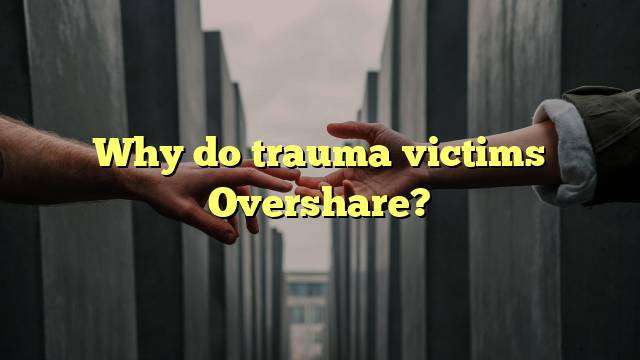Understanding Trauma Victims Who Overshare
Trauma is a deeply personal experience and the effects of it can manifest in many different ways. For some, it can lead to a need to overshare in an attempt to receive support and understanding. It is important to recognize the triggers that lead to oversharing, as well as the potential benefits.
What is Trauma?
Trauma is a psychological response to a deeply distressing or life-threatening event. It can include physical, emotional, and psychological pain, as well as a feeling of helplessness and vulnerability. Trauma can be caused by a single event, such as a natural disaster or an act of violence, or it can be caused by a series of events, such as an abusive relationship. It is important to note that trauma is not limited to physical injury, and can manifest in many different ways.
Why Do Trauma Victims Overshare?
Oversharing is a common response to trauma. It is a way of seeking validation and understanding, as well as a way of connecting with others. It can also be a way of coping with the trauma, as talking about it can help to process it and make sense of it.
However, it is important to recognize that oversharing can also be a sign that the trauma is unresolved and needs to be addressed. The need to overshare can be a sign that the trauma is unresolved and needs to be addressed.
The Benefits of Oversharing
Oversharing can be beneficial for trauma victims, as it can provide a sense of connection and understanding. It can also be a way of seeking support from others and can help to reduce feelings of isolation and loneliness. Talking about the trauma can also be a way of processing it and making sense of it, which can help to reduce the overwhelming feelings associated with it.
The Risks of Oversharing
Oversharing can also have negative consequences. It can lead to feelings of guilt and shame, as well as a feeling of being judged or misunderstood. It can also lead to feelings of vulnerability and a lack of control over what is shared.
How to Find a Balance
It is important to find a balance between oversharing and under-sharing in order to ensure that the trauma is addressed in a healthy and effective way. A good starting point is to identify the reasons for oversharing, such as seeking validation or support, and to consider how this could be achieved in a healthier way, such as seeking professional help or talking to friends or family.
What to Do If You Feel Trapped in Oversharing
If you find yourself in a pattern of oversharing and feel like you are unable to stop, it is important to seek help. Talking to a professional can help to identify the triggers for oversharing and develop strategies for managing it in a healthy way. It is also important to reach out to friends and family for support, as this can help to reduce feelings of isolation and vulnerability.
Conclusion
Oversharing can be a sign of unresolved trauma and it is important to recognize the triggers that lead to this behavior. It can be beneficial in some ways, as it can provide a sense of connection and understanding. However, it can also have negative consequences and it is important to find a balance between oversharing and under-sharing in order to ensure that the trauma is addressed in a healthy and effective way. If you find yourself in a pattern of oversharing and feel like you are unable to stop, it is important to seek help. Talking to a professional can help to identify the triggers for oversharing and develop strategies for managing it in a healthy way.



